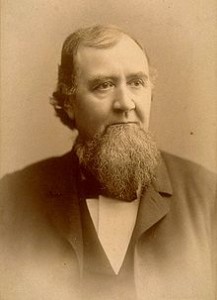On September 13, 1859, the “last notable American duel” took place in a ravine just outside San Francisco. Duels were illegal in California, but that didn’t stop David Colbreth Broderick and David Terry from squaring off to resolve their personal and political differences.
In 1849, David Colbreth Broderick came to California from New York with the Gold Rush. By 1857, he’d established himself as a political don of San Francisco; in 1851, the “free-soil” Democrat was named Lieutenant Governor of California after his predecessor, John McDougal, was promoted to Governor when Peter Burnett resigned. Friends considered Broderick an honest man and pointed to his humble upbringing as the son of a stonecutter. But Broderick’s rivals saw him as a conniving saloonkeeper who picked up politics in Tammany Hall. David Terry, on the other hand, hailed from Kentucky and was a proud Southern Democrat. He came to California after the Mexican-American War. In 1855, he was appointed Justice of the California Supreme Court. By 1857, Terry was Chief Justice. Though Broderick and Terry disagreed over slavery, the two were friends.That all changed in 1859, when Terry ran for reelection as chief justice and lost, presumably due to his pro-slavery stance. He blamed the opposing faction of the Democratic party—which was led by Broderick. Terry insisted on delivering a speech denouncing his abolitionist opponents, alleging that they were all “personal chattels of a single individual” and belonged “heart, soul, body, and breeches to David C Broderick.” When Broderick heard about Terry’s comments, he called Terry a “damned miserable wretch” and retorted, “I have said that I considered him the only honest man on the Supreme Court bench, but I now take it all back.” Terry immediately demanded a retraction, which Broderick refused to provide. Terry then immediately wrote a letter to “demand the satisfaction usual among gentlemen.”
The two men scheduled the duel for September 12, 1859. But news of the duel had spread, and the local sheriff showed up to intercede. He concluded that no law had been broken (yet) and went on his way. Broderick and Terry rescheduled the duel for the following morning. At the appointed time, a crowd gathered. Broderick and Terry took .58 caliber Belgian pistols and assumed their positions. Broderick fired first, but his shot landed in the grass short of Terry. Terry returned fire and struck Broderick. He initially thought he’d hit “too far out” to mortally wound Broderick.
The injured Broderick was taken to the home of Leonidas Haskell. Doctors confirmed that the bullet had penetrated Broderick’s lung. He died in the Haskell home three days later, on September 16, 1859, and to this day, the house is reportedly haunted by Broderick’s ghost. Over 30,000 people attended the senator’s funeral. Broderick’s death ultimately aided the Union cause by garnering popular support for the abolitionists. Historians consider the Broderick-Terry duel a critical factor in California’s remaining free of slavery.
Broderick had amassed quite the estate, mostly because he sold state positions of authority during his tenure as president of the state senate. His extensive real estate holdings—a total of 362 properties–were finally auctioned off on November 30, 1861. They included properties in prime locations like Larkin, Howard, and Mission Streets. If they were sold on today’s market, they’d undoubtedly fetch a nine- or ten-figure sum.
Terry was arrested and tried for participating in a duel, but was found innocent and released. He left California after the duel and later joined the Confederate Army during the Civil War, serving as a colonel in the Texas Calvary. Following the war, Terry returned to Stockton, California to practice law.
Terry is perhaps best remembered for representing Sarah Althea Hill Sharon in a lawsuit brought by her husband, Senator William Sharon. The senator sought to have the marriage canceled, and the California Supreme Court ruled in his favor after his death. Terry (who later married Sarah) blamed US Supreme Court Justice Stephen Fields for his loss. Then on August 14, 1889, Terry encountered Fields in the breakfast room of a railroad hotel. He slapped the justice across the face. Fields’ bodyguard, David Neagle, immediately shot and killed Terry. Neagle’s actions led to a jurisdiction dispute; state authorities claimed that the field marshal had committed murder, while federal authorities argued that he had killed Terry in the line of duty.
Related Rare Books and Ephemera
Documents in Relation to Charges Preferred by Stephen J Field, Public Auction of the Beidman Estate, Relacion de los debates de la Convencion de California, San Francisco Semi-Annual Trades Guide & Pacific Coast Directory, Steamship Yankee Blade, Thoughts of Idle Hours

![The Honorable David Culbreth [Colbreth] Broderick.](http://blog.tavbooks.com/wp-content/uploads/2015/11/broderick1-256x300.jpg)

